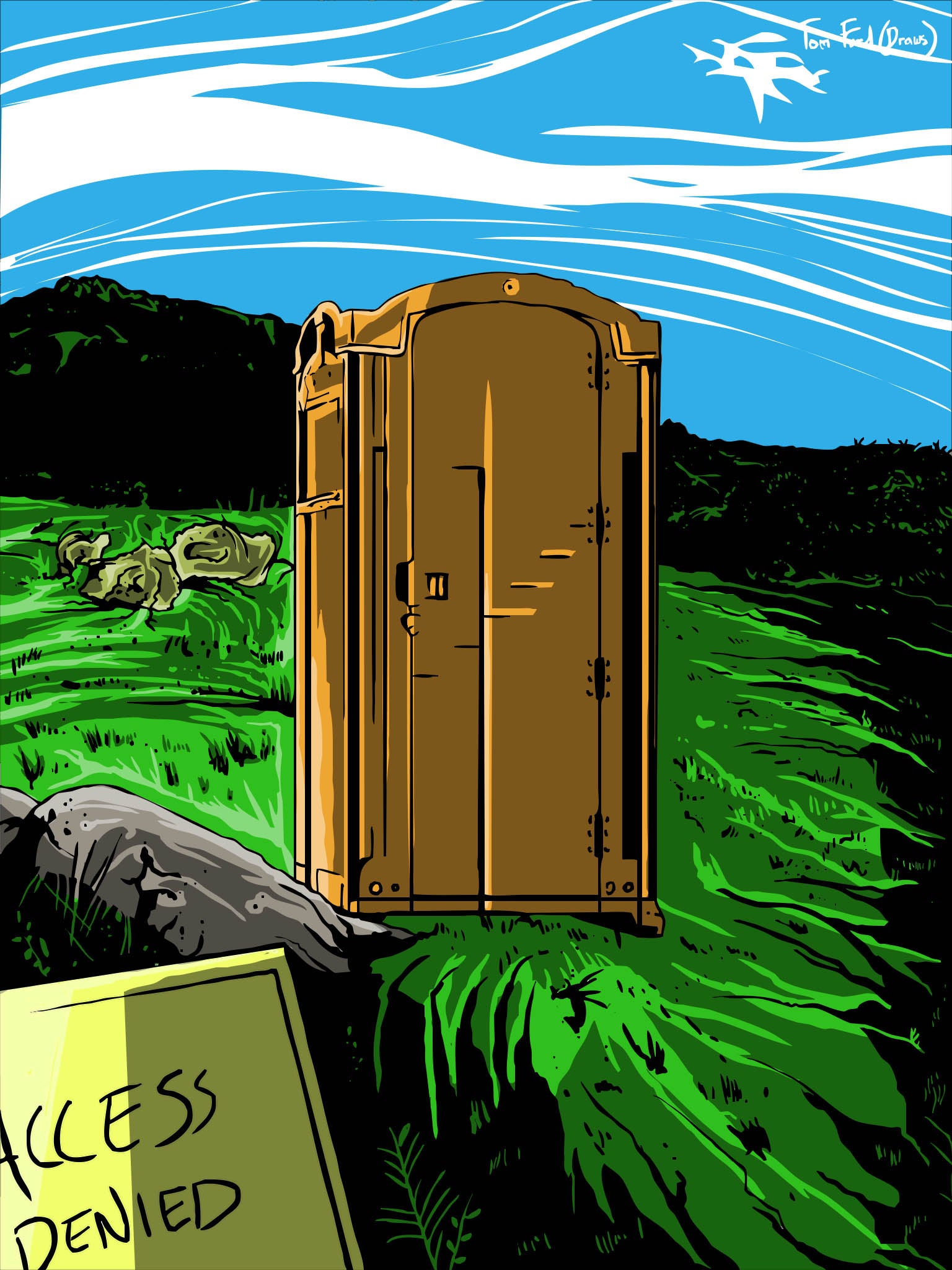Why 'Have you been?' isn't the only toilet-related question we should be asking
Continuing her series tackling socially unacceptable questions, Christine Manby says when so many are still struggling to access public facilities, it’s a conversation we should all be privy to


Looking after children involves the answering and asking of many questions. Anyone who has ever spent time with a three-year-old has answered the question “why?” to the point of “because I said so”. They have also almost certainly in turn had to ask that old classic: “Have you been?”
As in, “Have you been to the toilet?”, ordinarily asked at screeching pitch just as you’re about to head out the door to catch a bus, train, boat or plane with moments to spare. Something I wish I’d known, before I agreed to babysit my nephews when they were small, is that if you ask this question of an under-five that you’ve just wrestled into an anorak, you shouldn’t expect a truthful answer. If they say “yes”, then you will still be looking for a public convenience within three minutes of leaving the house. Nothing brings the need for good, clean public loos into focus like hearing a thin, high voice announce: “I need a wee wee now.”
“What? Right now?”
“Yes. And probably a poo...”
It has none of the easy glamour of those other days like World Poetry Day or the International Day of Jazz, but it draws our attention to something that has a serious impact on all of our lives
Anyway, 19 November is World Toilet Day, when all over the world people will dress up as their favourite WC… Or rather, the United Nations will encourage us to consider the humble toilet and its role in solving the global sanitation crisis. World Toilet Day has none of the easy glamour of those other days like World Poetry Day or the International Day of Jazz or even World Statistics Day (99 per cent of people questioned had no idea World Statistics Day is a thing) but like all those days, it draws our attention to something that has a serious impact on many – in fact, all – of our lives: access to a clean, safe loo.
Internationally, some 4.5 billion people do not have that access. Nearly a billion of those people still practice what is euphemistically referred to as “open” defecation, leading to the contamination of water and soil and the spread of such diseases as cholera, salmonella, norovirus and diarrhoea. That’s the easily preventable diarrhoea that kills more than 360,000 children under the age of five each year.
It’s not just faeces-borne diseases that make the want of a proper toilet a proper problem. Women are disproportionately affected by poor sanitation. As Kate Medlicott, technical officer at Water, Sanitation, Hygiene and Health at the World Health Organisation, pointed out on the occasion of last year’s World Toilet Day: “Lack of sanitation also increases the risk of sexual violence against women, as they are exposed to attacks when they leave the house at night to defecate. It also makes girls more inclined to drop out of school when they reach puberty.” Fatal diseases, sexual violence and the premature termination of education. All for want of a loo.
In the UK, you can help combat the problem by donating to Toilet Twinning, which funds the international relief and development agency Tearfund. For just £60, you can have the toilet at home or at your workplace or school “twinned” with an impoverished family’s latrine. You get a certificate. Tearfund gets to continue to provide clean water, basic sanitation and hygiene education in places such as war torn Central African Republic, South Sudan and Iraq. Tearfund toilet-twinned in Haiti in the wake of the 2010 earthquake and in the Philippines post Typhoon Haiyan. It’s currently working with Myanmar refugees in Bangladesh as well as continuing to deliver ongoing support to projects all over the developing world.
But the issues caused by the poor sanitation provision highlighted by World Toilet Day are by no means a problem faced only by those living in developing nations. Since 2010, almost 700 of the UK’s public conveniences have disappeared, leaving many of the UK’s high streets with no council-run toilets at all.
360,000
Children under five die each year from diarrhoea
Why are the loos disappearing? Behind oft-repeated concerns that public toilets are a magnet for drug users and associated crime, the real reason is transparently financial. Since local authorities are not legally obliged to provide loos, they’re an easy target for cuts. The example of Cornwall Council demonstrates the advantages when it comes to balancing the books. By cutting the loos they maintain from 253 in 2013 to just 14 today, they’ve saved more than £4m. Forget about spending a penny, they’re saving hundreds of millions of them.

But Cornwall by far isn’t the worst county when it comes to toilet provision. There are several councils that fund no public toilets whatsoever. Councils are relying on retailers, restaurants and cafes to pick up the slack but businesses have no obligation to provide facilities for people other than their customers.
Why are the loos disappearing? Behind oft-repeated concerns that public toilets are a magnet for drug users and associated crime, the real reason is transparently financial
Though toilet humour is of course the basis of much of British culture, the closure of so many loos is no joke. It’s not just people in charge of small children who have to consider the availability of toilet facilities when planning any outing. As Dan McLean, of Crohn’s and Colitis UK, points out: “For people with a chronic bowel or bladder condition, not being able to find or access a public toilet can be a blight on life and sometimes stop people going out altogether.”
There are thankfully some initiatives in place to help those who can’t hang on until they get home. The Bladder and Bowel Community distributes a “Just Can’t Wait” card, highlighting that the carrier has a medical condition that requires immediate toilet access. It’s widely recognised by shops and businesses. However, the card won’t solve the problem for everyone.
The Changing Places Consortium campaigns on behalf of an estimated 250,000 Britons who cannot use conventional disabled toilets but require extra space and equipment such as hoists and adult changing benches. One of those people is Kerry Thompson, whose blog charts her life with FHL1 Gene Mutation Muscular Dystrophy. She described to me the frustration of planning a day out. When she knows she’ll be out for up to five hours, she limits her liquid intake to avoid the risk of not being able to find a properly accessible loo when she needs one. When she says she limits her intake, she’s not talking about having just a couple of drinks either. “I’ll have two or three sips of water. If I’m going to be out for longer, I’ll try to drink nothing at all.” Which risks dehydration and headaches.
Thompson says she doesn’t expect most able-bodied people to understand. She’s often called venues to check disability access and been assured that the facilities she needs are in place, only to discover that the disabled loo is up a step or there’s not enough space to turn a wheelchair. “A handrail and a red cord isn’t enough.” Thompson concludes: “As a human being, I have the same rights as everybody else. I want to be able to go to the cinema, a theme park, see beautiful gardens and historical houses without having to worry that I might have an accident.”
Enshrined in the United Nations Sustainable Development Goal 6 is that everyone should have access to a safe toilet by 2030. In the light of that worthy target, it doesn’t seem so unreasonable that the UK should be aiming for at least the same level of public toilet access we had a decade ago, and a far better level of properly accessible loos so that no one ever has to stay home or limit their participation in a family celebration to two sips of water. When I asked her what a rollout of changing places toilets would mean to her, Kerry Thompson told me simply: “I would be included.”
A Ten Minute Rule Bill, introduced by Paula Sherriff MP, regarding the provision of changing places toilets passed a first round in the House of Commons in June of this year. The next reading of the bill will take place on 23 November. There is already a changing places loo in Westminster. Meanwhile, I’m crossing my fingers that we’ll all be able to uncross our legs again soon.
Christine Manby has written numerous novels including ‘The Worst Case Scenario Cookery Club’
Join our commenting forum
Join thought-provoking conversations, follow other Independent readers and see their replies
Comments